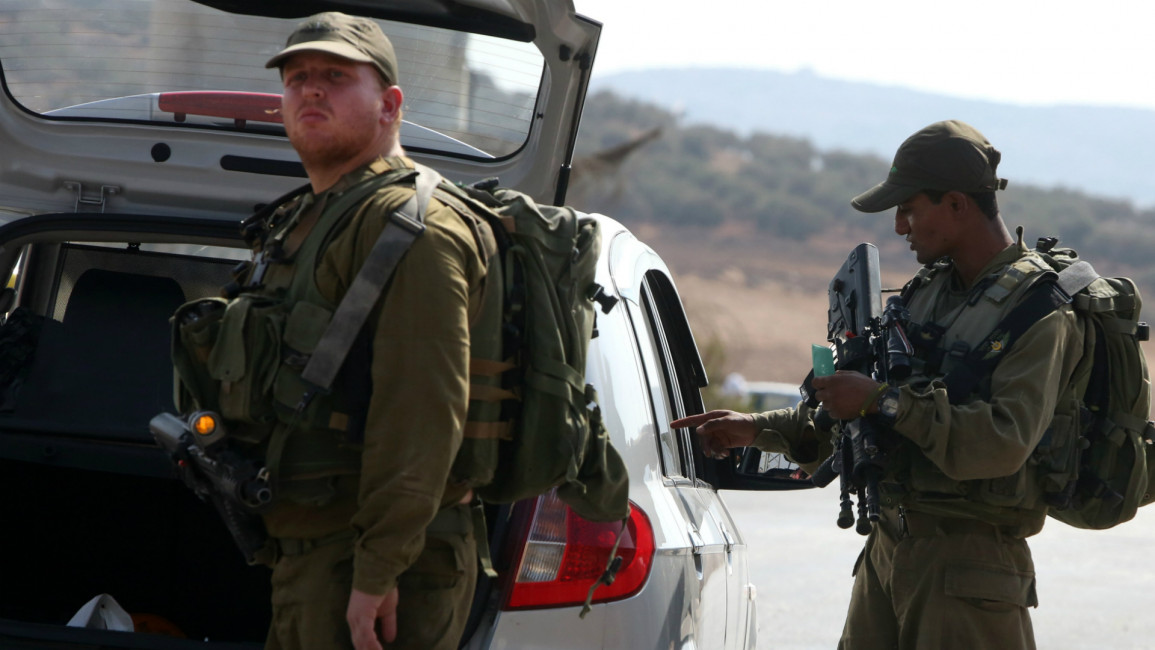Hamas members reportedly confess to killing Israeli couple
Hamas members reportedly confess to killing Israeli couple
Following confusion over who was responsible for the killing of an Israeli couple last week, five Hamas members have been arrested and reportedly confessed.
2 min read
Israeli soldiers check a car near the scene of the attack [AFP]
Israel has announced that five Hamas members have confessed to the killing of Israeli settlers near Nablus last week after being arrested and held in custody.
The attack targeted Eiran and Naama Henkin, who were in their 30s, while they were travelling between settlements. They were travelling in a car with young children.
There has been some confusion surrounding the attack, as the Abdel Qader al-Husseini Brigades, a group affiliated with Fatah's al-Aqsa Martyrs' Brigades, originally claimed responsibility for the attack.
However, on Monday, it was announced that Israel had arrested the "cell" responsible.
Hamas avoided accepting direct responsibility for the attack, but said that the cell would "not be the last".
"The occupation's announcement of the arrest of the Nablus cell is an honorable announcement for our people and their resistance," said Hamas spokesman Sami Abu Zuhri.
Although some news outlets initially reported that the five men were planning on refuting the allegations, they have now reportedly confessed.
Internal Israeli security services named the cell leader as Ragheb Ahmad Muhammad Aliwi, a previously jailed Hamas fighter from Nablus, who reportedly recruited the other four men.
One of the defendants in an initial court hearing reportedly said the attack had been in retaliation for the killing of the Dawbashah family. "You killed our children, we refrained from killing your children," the defendant has been reported as saying.
Rami Abdu, of the Euro-Mediterranean Centre for Human Rights, said that most information about the case so far had come from "Israeli sources", and the centre was attempting to contact the accused lawyers for more direct information.
At dawn on Tuesday, Israeli security forces raided homes in Nablus for the fifth night in a row. They re-arrested a number of former prisoners, and detained both Fatah and Hamas members.
During the second intifada, Palestinian attacks targeting Israeli civilians, particulary settlers, were common. However, since coming into power in Gaza, Hamas has largely attempted to adopt a more conciliatary approach.
The attack targeted Eiran and Naama Henkin, who were in their 30s, while they were travelling between settlements. They were travelling in a car with young children.
There has been some confusion surrounding the attack, as the Abdel Qader al-Husseini Brigades, a group affiliated with Fatah's al-Aqsa Martyrs' Brigades, originally claimed responsibility for the attack.
However, on Monday, it was announced that Israel had arrested the "cell" responsible.
Hamas avoided accepting direct responsibility for the attack, but said that the cell would "not be the last".
"The occupation's announcement of the arrest of the Nablus cell is an honorable announcement for our people and their resistance," said Hamas spokesman Sami Abu Zuhri.
Although some news outlets initially reported that the five men were planning on refuting the allegations, they have now reportedly confessed.
Internal Israeli security services named the cell leader as Ragheb Ahmad Muhammad Aliwi, a previously jailed Hamas fighter from Nablus, who reportedly recruited the other four men.
One of the defendants in an initial court hearing reportedly said the attack had been in retaliation for the killing of the Dawbashah family. "You killed our children, we refrained from killing your children," the defendant has been reported as saying.
Rami Abdu, of the Euro-Mediterranean Centre for Human Rights, said that most information about the case so far had come from "Israeli sources", and the centre was attempting to contact the accused lawyers for more direct information.
At dawn on Tuesday, Israeli security forces raided homes in Nablus for the fifth night in a row. They re-arrested a number of former prisoners, and detained both Fatah and Hamas members.
During the second intifada, Palestinian attacks targeting Israeli civilians, particulary settlers, were common. However, since coming into power in Gaza, Hamas has largely attempted to adopt a more conciliatary approach.



